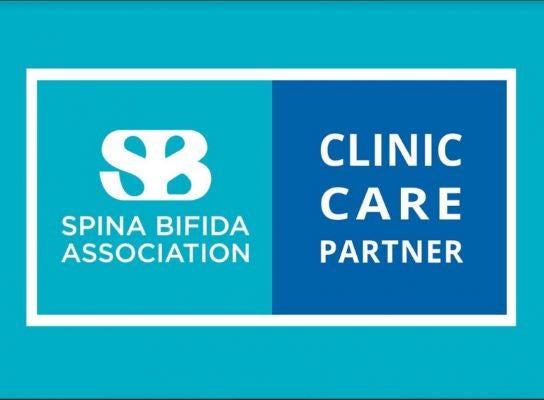Pediatric spina bifida care at Dell Children's

Specialists at Dell Children’s Medical Center in Austin provide care for children with spina bifida. Our physicians have the expertise to diagnose and treat spina bifida, sometimes before your child is born. And your child is cared for by an experienced care team delivering specialized therapeutic and advanced surgical care for children with this condition. Our fetal care center and multidisciplinary approach to care means your child benefits from the expertise of multiple specialists and a comprehensive care plan.
Dell Children’s is recognized as a Spina Bifida Association Clinic Care Partner. This designation means our program has met specific standards and is committed to collaborating with a national network of providers to implement best practices.
Diagnosing spina bifida during and after pregnancy
 Spina bifida is a condition that affects the spine and occurs when the neural tube does not fully close during the first month of pregnancy. Spina bifida can be diagnosed during pregnancy or after your baby is born. During pregnancy screening tests (prenatal tests) can be used to check for spina bifida, such as ultrasound or amniocentesis. In mild cases, spina bifida might not be diagnosed until after a baby is born.
Spina bifida is a condition that affects the spine and occurs when the neural tube does not fully close during the first month of pregnancy. Spina bifida can be diagnosed during pregnancy or after your baby is born. During pregnancy screening tests (prenatal tests) can be used to check for spina bifida, such as ultrasound or amniocentesis. In mild cases, spina bifida might not be diagnosed until after a baby is born.
If your baby is diagnosed with spina bifida before they are born, your doctor may refer you to a maternal-fetal medicine specialist at Dell Children's - Comprehensive Fetal Care Center. This center is the first and only fetal care center in Central Texas. We provide comprehensive care for babies with even the most complex fetal and congenital conditions. Your first appointment is scheduled as soon as possible. Your care team at the Comprehensive Fetal Care Center includes fetal medicine specialists, genetic counselors, maternal-fetal medicine doctors, OB-GYNs, neonatologists, and other pediatric specialists. Your care team may recommend additional tests, such as ultrasound, MRI and fetal echocardiogram (fetal echo).
Your care team takes the time to fully explain your child’s diagnosis and answer your questions – big and small. There are several different types of spina bifida. The three most common types are myelomeningocele, meningocele and spina bifida occulta. Your child’s doctor will explain what type of spina bifida your child has, what symptoms they may experience and treatment options.
Advanced care during and after delivery
To make sure you and your baby have the most advanced care, your doctor may refer you to deliver your baby at Dell Children’s Medical Center - Specialized Delivery Unit. This delivery unit is connected to the highest level of neonatal intensive care at our Level IV NICU.
Your care team includes specially trained labor and delivery nurses, OB-GYNs, pediatric anesthesiologists, neonatologists, fetal interventionalists, maternal-fetal medicine specialists (MFMs), nurse coordinators, ultrasonographers, and more. Your care team also works with other pediatric specialists at Dell Children's to provide comprehensive care for babies born with spina bifida.
Treatments for children with spina bifida
-
SurgeryDell Children's has the only Level I Children's Surgical Program in Central Texas and provides advanced surgical care for your child.
-
Urologic careSpina bifida can cause incontinence (inability to control when you go to the bathroom), urinary tract infections (UTIs), and kidney and bladder conditions. Pediatric urologists work with you and your child to create a care plan that’s right for your child. Care plans may include special diets, catheters, colostomy bags, and other treatments.
-
MedicationsMedications may be recommended as part of your child’s care plan. Medications can help relieve some of the symptoms of spina bifida, such as bladder dysfunction and depression.
-
Physical, occupational, and speech therapyPediatric therapists at Dell Children’s create personalized therapy plans for children with spina bifida. Your child’s care plan may include a combination of physical therapy, occupational therapy and speech therapy.
-
Wheelchairs and other equipmentSpina bifida can affect some children’s ability to walk. To help improve your child’s mobility, we work with your child to find a walking aid that’s right for your child. Our care teams help your child adjust to using a walking aid, such as a brace, walker or wheelchair.
A multispecialty approach to care
- Maternal-fetal medicine specialists
- Pediatricians
- Neurosurgeons
- Urologists
- Spine specialists
- Orthopedic specialists
- Physical medicine and rehabilitation specialists
- Physical, speech and occupational therapists
- Dietitians
- Geneticists
- Audiologists
- Psychologists
- Social workers
- Specialized nurses
Meet our care team
Neurosciences
- M. Omar Iqbal, MD, Pediatric Neurosurgery
- Elizabeth Tyler-Kabara, MD, Pediatric Neurosurgery
- Shannon Burke, APRN, Pediatric Neurosurgery
- Jennifer Farley, APRN Pediatric Neurosurgery
- Ashley Griffin, APRN, Pediatric Neurosurgery
- Jacob Rosenbaum, PA, Pediatric Neurosurgery
- Meghan Straub, APRN, Pediatric Neurosurgery
- Rosalia Costello, PsyD, Pediatric Neuropsychology
- Faheem Mahomed, MD, Physical Medicine and Rehabilitation
Orthopedics
- Brian Kaufman, MD, Pediatric Orthopedic Surgery
- Jamie Moore, RN, CPNP, Pediatric Orthopedics
Urology
- George Seremetis, MD, Pediatric Urology
- Mary Kathleen Wang, MD, Pediatric Urology
Bowel Management
- Amy Gann, RN, CPNP-AC/PC
- Lauren Schneider, CPNP-AC/DC
Other Members
- Michele "Mitzy" Veloz, RD, LD, Pediatric Dietitian
- Katie Navarro, PT, Pediatric Physical Therapy
- Mallorie Garcia, MOT, OTR, Pediatric Occupational Therapy
- Sandra Lopez, MSN, RN-BC, Pediatric Nursing
- Gina Wilhm, RN, CPN, Pediatric Nursing
- Andrea Shelton, LMSW Social Work

